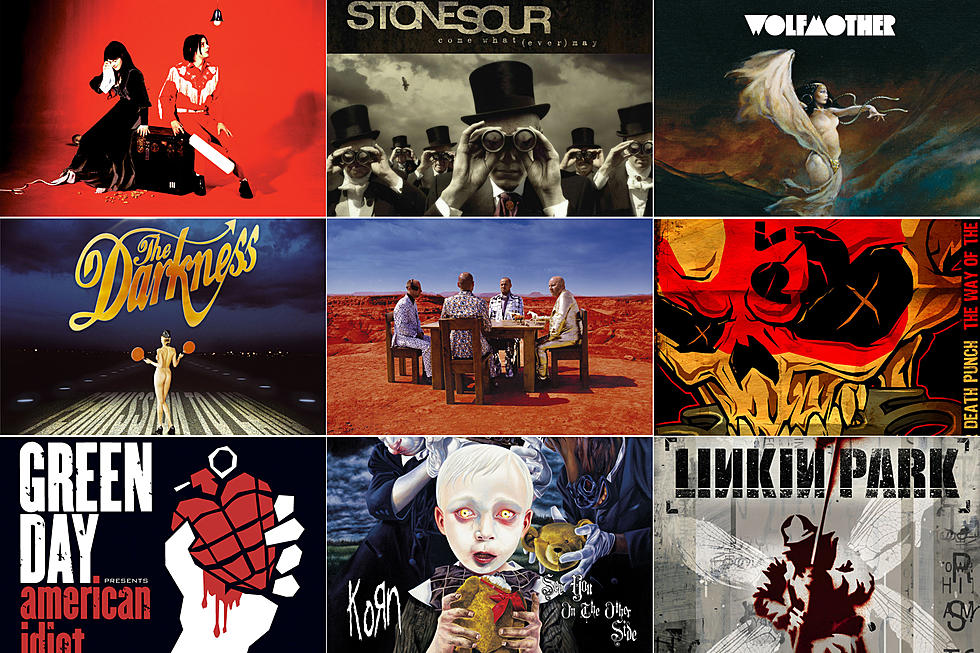
The Used’s Bert McCracken Philosophizes on the Past, Present and Future
Welcome to Part 2 of our exclusive dip into the mind of the Used's Bert McCracken. In this second half of our talk with the Used singer, McCracken talks about his continual lyrical theme of 'time,' the difference between recording vocals for the band's debut and the band's upcoming 'Imaginary Enemy' album, his favorite philosophers + much more.
In Part 1 of our interview with Bert, the singer went in depth about 'Imaginary Enemy,' political revolutions, the rise of social media + more. We found the vocalist's perspective so interesting that we split the discussion into two parts, so here's the remainder of what Bert McCracken offered us.
Enjoy the second half of our exclusive interview with the Used's Bert McCracken!
One thing I've always noticed is that the word ‘time’ keeps showing up in your lyrics. Whether "It's our time to shine," "It isn't worth my time," "Time takes us all," "It's my time to burn" etc. What is the significance of the word 'time' in your life?
Since I was really little I’ve been obsessed with time.
Since I was really little, I’ve been obsessed with time, the subjective and objective time. Learning about Einstein’s theories of relativity and understanding that time actually does speed up and slow down and the fact that we have to justify linear arrangement of time because it’s the only thing that suits our human misunderstanding. Maybe the majority of the time I would use the word 'time' is a bit cynical. We’ll notice how when we’re so low or what we believe to be low, how time slows down and minutes become hours. And "Time flies when you’re having fun," and it’s actually true. I’ve always been really interested in that and the philosophy and perspective of time.
Was your perspective of time that scientific for you when you were in the studio recording the Used's first record?
It’s all subtle and subconscious. I think that once it comes out, it might not mean anything in the moment, but where did it actually come from and what is a muse? Where do all these lyrics come from? It’s astonishing to me, I could think about it for the rest of my life. Most of the songs that I wrote in 2000 mean so much more to me now than they ever did. 'The Taste of Ink' is a song about revolution and a song about true personal happiness and freedom -- happiness being devoid of pain and shame of the system. It feels good to have those moments in life and it’s not always like that. To embrace those moments puts all the negative preparation in perspective.
I remember listening to 'The Taste of Ink' in high school and going through real crappy times as every kid does. That song, specifically for me, captures that moment of catharsis where you can say, "I did it!" I always wanted to have that moment. 'The Taste of Ink' made me feel just a little bit of what that moment is really like.
That's awesome. I think even deeper beyond these things, once you get past your own distorted definition of success, we find that those moments happen more personally and on the inside than they ever do on the outside when it comes to successes with our monetary situations or with our social situations, whatever it might be. These victories come from inside and it’s those emotional victories that when I look back now, 'The Taste of Ink' might have been about having the opportunity to realize my dream of being on tour and being able to share my music with everybody, but that came from inside. I had to allow myself that freedom and once I realized that my definition of success was unimportant, I think that is when everything kind of sunk in.
In the past, you’ve had a few issues with your voice and you actually needed surgery. How was your voice feeling during the 'Imaginary Enemy' sessions and how has it felt on your most recent tours?
I find that we don’t want anything to sound perfect, we want it to sound human.
It’s great and it’s changed a lot. The recording process, first going in with John Feldmann, we wanted to dissect everything and we had a very different approach at recording music. I would literally do hundreds of takes when recording a song for 4 or 5 to 8 hours. With 'Imaginary Enemy,' it was a 'one take jake' kind of business. That’s where the emotion is. I find that we don’t want anything to sound perfect, we want it to sound human.
There’s a fine balance because we do want our songs to sound good, and I love production and I love thoughtful music and I love good-sounding music. We took a chance with 'Ocean of the Sky' and it sounds like s--t. That’s cool for the moment, I didn’t want to remake it, but this record plays around with singing out of tune and leaving things a little bit messy and maybe a little more noisy than what you might like to hear, but that’s what I wanted. Things that sound really nice too, and produced with real strings and the sound that was kind of preconceived and worked on, but there’s real kind of impulsivity on the record that makes it feel more real to me.
Your first record was on Warner. Do you think being on that label lent itself to the hundreds-of-takes kind of thing? Does being on an independent label now give you more freedom?
Sure, but it was just my approach, as well. In the beginning, everything was really relaxed. With the label, actually, with the first and 99 percent of the second record, it was 100 percent artistic creative freedom on our end. Maybe I was scrutinizing my shot at success a bit more than I should have and I was immature and naive. I’ve been to L.A. a couple times, flew out to L.A. to John Feldmann’s house and he’s talking about how he’s hung with Fat Mike [NOFX] and Tim from Rancid. I’m a kid from Utah and it’s blowing my f---ing mind. He’s driving a BMW and I’m like, "Uh oh." [Laughs] So it was a lot of things in the beginning, it really was. Being more comfortable with and more okay with just who I am. Take it or leave it. That’s where we’ve come, I guess.
Where do you see yourself in 5 years?
In the midst of a successful uprising. [Laughs] I would hope that things would get a lot better in the U.S. It’s going to be crazy to see what happens in 2016. I don’t think people are standing by so docile anymore. I think people are becoming, like we talked about, that awareness is spreading. Five years, I want to be writing a lot more. I’ve kind of embraced this new lost love of the written word. My mom is a school teacher, so I grew up reading, I grew up around a lot of books. I was just too drunk for it when I started the band. I was really selfish and really immature. I was way too young to embrace any type of world issue or even think past my own hangover. That’s where I was and that’s who I was. I can’t get down on myself for the mistakes I’ve made in the past, just be more aware of what I’m capable of in the future.
Having followed your career, you’ve led such an interesting life with many highs and lows. Have you ever considered writing an autobiography?
Yeah, but I’d love to make it… I guess an autobiography, for me, the best autobiographies I’ve read have been written late, late in life. Who knows how I’m going to feel? Maybe I’ll be a Laissez-faire capitalist in 40 years. [Laughs] I doubt it.
I’ve written three essays for this new record that will be in the record and I'm trying to get them published somewhere. Maybe Huffington Post will pick them up; essays about the War on Terror, the War on Drugs and the War on Poverty. I’m a bit of a perfectionist and I have a lot of compulsive tendencies. I kind of feel like I have to read every 40 zillion books in the world before I actually write one. There are a lot of pieces I’ve been working on and if you take the time to read these essays in the new record, you’d be stoked. I know I can put words together as good as the next guy, so it’s exciting prospect in the future.
I’m just obsessed with how religion has ruined the world, maybe because I grew up Mormon.
Being touched by a book is an incredible thing. You're time traveling. That’s why the Bible to me is crazy and interesting. I’ve scrutinized and gone crazy on it. One thing we know for true is that it wasn’t written by some sky dictator. [Laughs] But it’s definitely the most profound and interesting book in the world. It’s the most influential book in the world. Just reading old words, it’d be crazy to learn Greek and read the original New Testament or learn Hebrew and read the Old Testament. I’m just obsessed with how religion has ruined the world, maybe because I grew up Mormon. [Laughs]
Looking deep into what people believe, you have to find a sort of respect for beliefs in general. I think that’s how we will find peace in the world. I think it’s important for people to discuss what they believe and then have an argument and then have a hug after. How important do our opinions have to be in a world of 7 billion people? How deluded have we become?
'Imaginary Enemy,' I was inspired by a book of essays by this really incredible professor of semiotics in Italy. His name is Umberto Eco. He wrote this book of essays called ‘Inventing the Enemy.’ I’ve been really influenced by Salman Rushdie and both sides of religious beliefs and secular beliefs and how they sometimes clash in the most awful ways.
Being American or embracing American patriotism, if you will, just means being terrified of the rest of the world. Who taught us to hate all these people? Our founding fathers; the idea for the country was to eradicate everyone who was poor and brown. That’s how the war on drugs started. All these policies and prohibition laws came into place to eradicate ethnic cultures. We just need to move on. Any culture that wasn’t taking from the Earth was quickly sorted out, if you will.
Who are your personal heroes? Who do you personally look up to?
We put a lot of emphasis on heroes, I guess, but understand that people are people. Even though some of the best people in the world or the most influential people in the world like Gandhi, he has a sordid past if you look deep. Malcolm X is a great revolutionary, but he had one too. Even if you go back to John Brown and the whole revolution of the Civil War, it started through anarchy. People taking the law into their own hands and assassinating slave owners.
I think that our heroes are just as confused as we are and are as just as insecure as we are. It's more important than ever to have the courage and the confidence to be wrong nowadays and to continuously learn from our mistakes from empirical evidence and from the world. If you believe like I believe, we’re all connected in some way. Humanity is my responsibility. There’s a lot of time to have fun and goof around and there's a lot more time to take things seriously as well. Finding that balance, I think, is what's important.
If I had to pick people, the historical Jesus that we know of, who was a political anarchist and ready to tell people to pick up the sword against the Roman Empire. These type of people who questioned authority and questioned the world we live in and questioned the idea of control, should be heroes. No one came back from the dead and was born out of virgin vagina, all this other crazy nonsense. As humans, we always take things too far because of our own ego. "How is it that after I die it’s nothing? I can’t accept that because I’m far too important!" It’s a little sad.
The thing that’s great about science and theory is that we’re constantly looking for the next truth. Things are always up for debate. Things always subject to be disproven.
The Used will release 'Imaginary Enemy' on April 1. To pre-order the album, click here.
More From Loudwire









